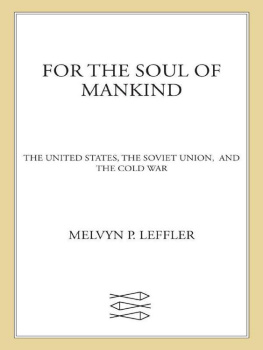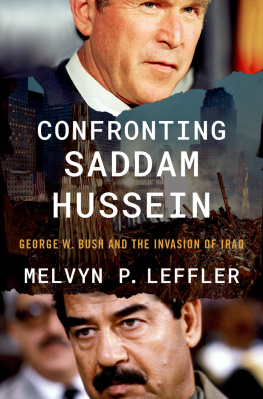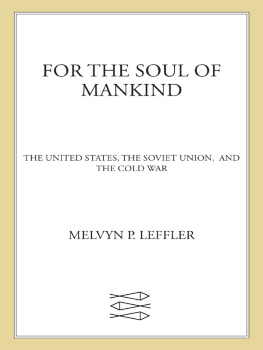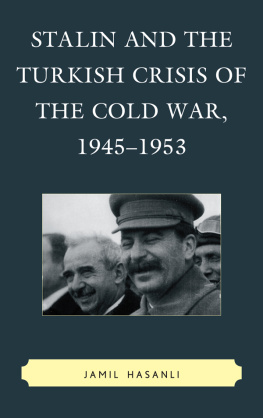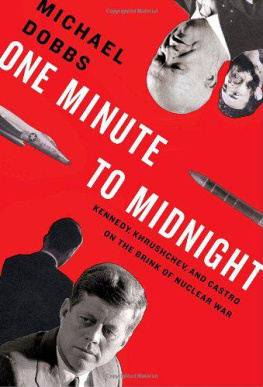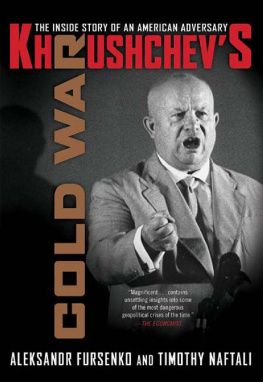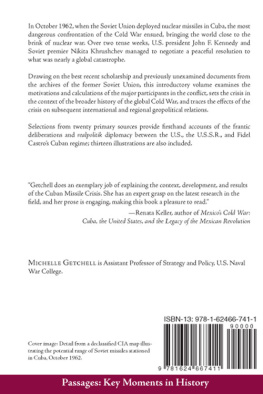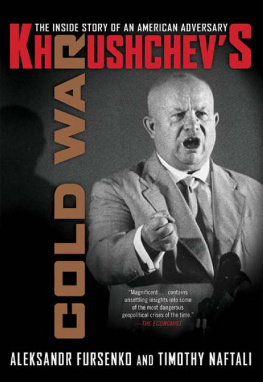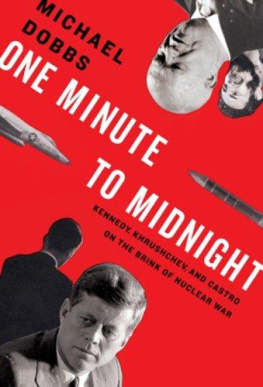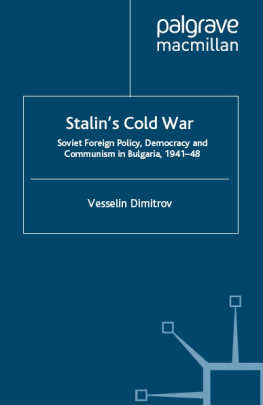
For P.J.K.L.
Contents

Illustrations

Maps

Introduction
The Cold War was a struggle for the very soul of mankind, former president George H. W. Bush wrote a few years ago. It was a struggle for a way of life.
A decade ago, when I began work on this book, I would not have thought that I would come to view the Cold War in this manner. In 1989 and 1990, when I was finishing a book on the Truman administrations national security policies, I had been stunned by contemporary developments. Free governments arose in Eastern Europe. The Berlin wall came down. Germany was unified. Soviet-American competition in the third world abated. The Cold War ended. I had never imagined that these events would occur in my lifetime. Less than a decade before, the Cold War seemed to be entering a deep freeze. After the Soviet invasion of Afghanistan, in December 1979, relations between the United States and the Soviet Union appeared more ominously hostile than at any time since the Cuban Missile Crisis of 1962. Responsible officials talked and wrote about waging and winning nuclear wars. People in Moscow and Washington read articles about surprise attacks. Ideological foes inspired by malicious intentions were alleged to be on the prowl, seeking to take advantage of propitious moments to gain a preponderance of power. If officials were not vigilantthe same language was used in Moscow as well as in Washingtonthe adversary would employ its military power for blackmail. Concessions would lead to worse concessions. Allies would lose faith, clients would feel betrayed, the world balance of power would be upset, and vital security interests would be impaired. Leaders in Moscow and Washington never tired of telling their people that their way of life was at stake. The Cold War, it seemed, would last indefinitely or end in catastrophe.
Consequently, most of us were astonished by the turn of events when, in the half dozen years between 1985 and 1991, power in the international system was reconfigured and an ideological struggle that had engulfed the globe for almost a half century was ended.
How did this happen? Powerful men, Ronald Reagan and Mikhail Gorbachev, had dramatically altered the course of history. But if they were able to do this so decisively, I began to wonder whether other leaders might have done likewise. Why, after all, did the Cold War last as long as it did? Might there have been other moments, other opportunities when the conflict could have been resolved? If men so different ideologically as Reagan and Gorbachev could muster the will and the ability to change the Soviet-American relationship, might their predecessors have done so? Had they ever thought of doing so? If so, why did they fail, and Reagan and Gorbachev succeed?
Tantalizing documents and memoirs from Moscow, Budapest, Berlin, Warsaw, Prague, and Beijing began to appear. As I read many of the new books and articles based on these newly released archival materials, and as I began examining the documents themselves, I was struck with a surprising and repeated fact, often submerged beneath the more dramatic details about espionage, subversion, nuclear blackmail, and proxy wars: leaders in Moscow and Washington often realized that their competition was counterproductive. They often understood the liabilities of the Cold War dynamic. They knew that the global rivalry diverted resources from domestic priorities, and that the arms race made little sense. They realized that the Cold War involved them in civil wars and regional conflicts in Asia and Africa that bore little relation to the vital interests of their own nations. They recognized that local crises in faraway places might engage them in escalatory measures that could get out of control and lead to a nuclear exchange.
On the one hand, these new documents suggested that the Cold War leaders were wiser or at least more knowledgeable than I had imagined. They understood the risks they were taking and calculated the tradeoffs they were making. Although this was interesting, it was also troubling. Why did they continue a rivalry that courted disaster for all humankind? Why did they continue a rivalry that diverted resources from priorities their own people clearly favored? Why were they not content to demonstrate the superiority of their way of life without arms races and proxy wars? If they grasped, even occasionally, that they had much to gain from avoiding a cold war, or modulating it, or disengaging from it, why did they not do so? And why did things change in the mid-1980s?
Many explanations have been given for the behavior of the two superpowers during the Cold War. These explanations often focus on great men, some of whom were outrageously evil, such as Joseph Stalin, some of whom spoke nobly about freedom and diversity, such as John F. Kennedy, and all of whom are fascinating to usfor the power they wielded and for their potential to do good or bad in the world.
Other explanations focus on the configuration of power in the international system. All governments respond to dynamics in the international environment that are beyond their control, the argument goes. They seek to fill power vacuums or, alternatively, strive to survive in a dangerous world where threats abound and where the nave are punished if they are lucky and perish if they are not.
But governments do not simply respond to changes in the international environment. Governments are run by men and women with ideas and historical memories. Their beliefs and memories influence their understanding of what is going on in the world, shape their perception of threat and opportunity, and inspire dreams and visions about what might be accomplished at home and abroad.
Yet these men and women cannot always do what they aspire to do, because they are buffeted by domestic interest groups, public opinion, and powerful bureaucracies. Democratic statesmen are sensitive to domestic constituencies and to legislative-executive relationships, and they are sometimes beholden to economic interest groups whose views they may not share. Leaders in authoritarian, even totalitarian, countries must also contend with bureaucracies that have divergent aims and concerns. No leader, anywhere, acts in a domestic vacuum in which policy can be made with indifference to internal constituents, bureaucracies, and interest groups.
Leaders also have their constituents abroad, formal allies and sometimes informal clients, governments with their own interests that they pursue vigorously, sometimes with cunning and guile and sometimes with a dazzling candor and boldness. These clients and allies are never as weak as they may seem, and great powers aiming for hegemony cannot disregard them.
In seeking to understand why the Cold War lasted as long as it did, I have pondered the role of human agency. I have looked at the so-called realist theories that focus on power and survival and that dwell on the distribution of power in the international system. I have examined the influence of ideas, ideologies, and historical memories and pondered how officials construct their own realities. I have weighed the impact of domestic opinion, interest groups, and bureaucracies, including the military-industrial complexes. I have tried to analyze the role of allies and clients. My desire was to follow the trail of the evidence, keeping in mind the many persuasive interpretations of great-power behavior during the Cold War. Yes, of course, this is a nave statement. Its intent is to suggest that I was not consciously wed to a particular theory, and that I had an open mind about the interpretative power of different lines of inquiry. I wanted to think about all of them and weigh them against the evidence.
Next page
